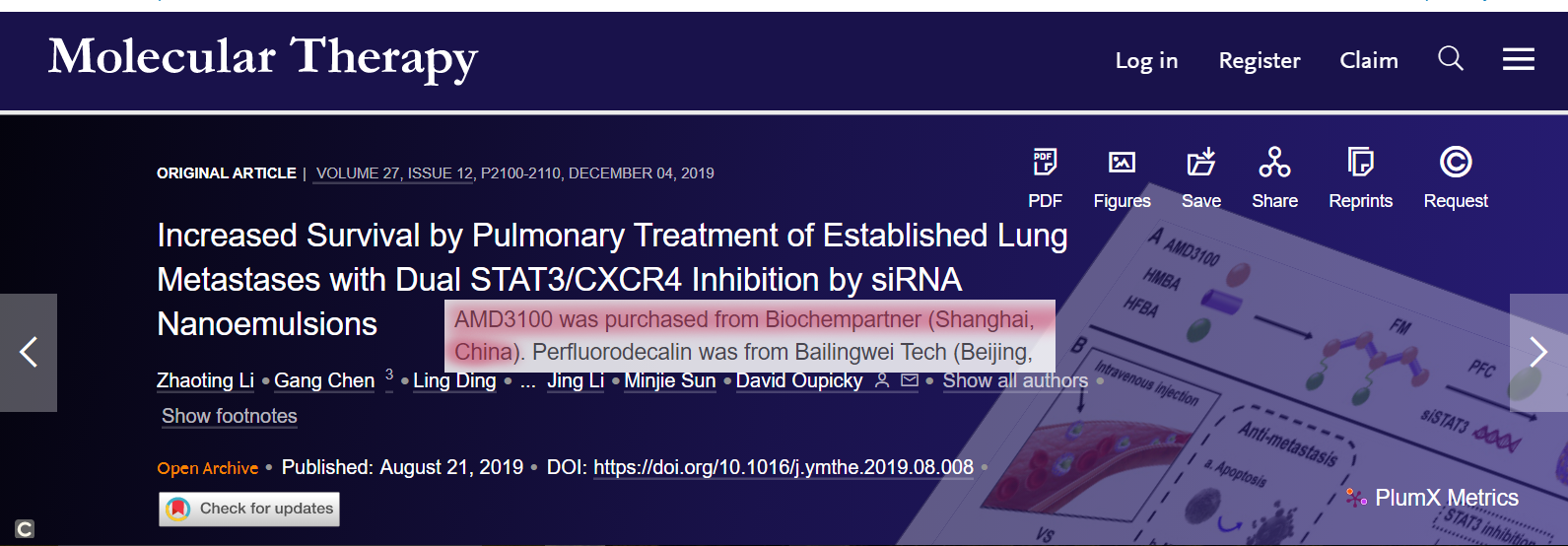Increased Survival by Pulmonary Treatment of Established Lung Metastases with Dual STAT3/CXCR4 Inhibition by siRNA Nanoemulsions

Introduction The vast majority of deaths caused by solid cancers is the result of metastatic spread of the primary disease.1 Lung metastasis is a common occurrence and lethal determinant in many cancers. The most common primary tumors in adults that metastasize to the lungs include breast cancer, renal cell carcinoma, colon cancer, and head and neck cancer. In the pediatric population, the most common primary tumors that develop lung metastases are osteosarcoma, rhabdomyosarcoma, and Ewing sarcoma.2, 3, 4, 5 Despite the efforts in the development of better therapies, progress in the treatment of advanced pulmonary metastatic disease remains limited. Direct pulmonary delivery (p.d.) emerged as an attractive approach to treat lung metastases due to the direct access to the disease site and minimization of the systemic exposure in patients subjected to prior or concurrent systemic chemotherapy.6, 7 Multiple types of delivery vectors showed promise in the treatment of both lung metastasis and primary lung cancer. For example, codelivery of a chemotherapy doxorubicin and anti-Bcl-2 small interfering RNA (siRNA) to the lungs provided a local treatment strategy for lung cancer.8 In lung metastatic melanoma and Lewis lung carcinoma, intratracheal administration of therapeutic siRNA by cationic lipid particles showed promising activity.9 p.d. provides enhanced retention of the active ingredients in the lungs and decreased absorption into the systemic circulation, making it suitable for the treatment of advanced lung metastasis. The process of metastasis is complex and involves various factors, including multiple chemokines and chemokine receptors that are responsible for cancer cell migration and invasion. CXCR4 is a prominent chemokine receptor that, together with its ligand CXCL12, plays a crucial role in breast cancer metastasis to the lung.10, 11 CXCR4 activation leads to the initiation of multiple signaling pathways that regulate cell adhesion, invasion, angiogenesis, and proliferation.12, 13 Recent evidence also shows that CXCR4 inhibition decreases tumor fibrosis, increases T cell infiltration, and helps to overcome immunosuppression in metastatic breast cancer models, suggesting the CXCR4 axis as a promising target for combined immunotherapy strategies.14, 15 Signal transducer and activator of transcription 3 (STAT3) is a transcription factor that provides important support for the proliferation of cancer cells and metastasis. Activated STAT3 regulates the function of many non-transformed cells that affect metastatic sites and constitute the tumor microenvironment. Specifically, STAT3 is involved in the infiltration and activation of immunosuppressive cells, such as T-regulatory cells (Tregs), T helper 17 cells, and myeloid-derived suppressor cells (MDSCs).16, 17, 18 STAT3 induces the expression of various cytokines, growth factors, and pro-angiogenic factors, whose receptors then in turn activate STAT3 in a feed-forward loop between cancer cells and immune cells in the tumor microenvironment.19, 20, 21 Thus, activation of STAT3 contributes both to the tumor-promoting inflammation and the suppression of anti-tumor immunity. Persistent activation of STAT3 is associated with malignant properties,22, 23 which makes it an attractive target for cancer therapy. Combining CXCR4 and STAT3 inhibition is a promising approach for antimetastatic and tumor immune microenvironment-modulating therapies. We have previously reported the development of fluorinated polycations with enhanced cell association and gene transfection efficacy.24, 25 In the present study, we aimed to investigate a fluorinated polymer with CXCR4 antagonist properties, named FM, as a vector for pulmonary siRNA delivery in advanced lung metastatic disease. To that end, we have prepared perfluorocarbon (PFC) nanoemulsions stabilized with FM as a functional vector for p.d. of therapeutic STAT3-silencing siRNA (siSTAT3) (Figure 1A). CXCR4 and STAT3 are closely involved in the formation of lung metastasis, and we have previously reported that p.d. of CXCR4 and STAT3 combined inhibitors achieved good anti-lung metastasis efficacy in osteosarcoma.26 Here, we further expanded the use of this treatment strategy to pulmonary metastases of different origin (breast cancer) and conducted direct head-to-head comparison of p.d. with intravenous (i.v.) treatment using the same therapeutic targets (Figure 1B). This study clearly demonstrates the benefits of local p.d. treatment when compared with the i.v. administration. The FM-stabilized PFC (FM@PFC) nanoemulsion opens up the opportunity and establishes a therapeutic pulmonary siRNA delivery nanoplatform for the treatment of advanced lung metastasis.




